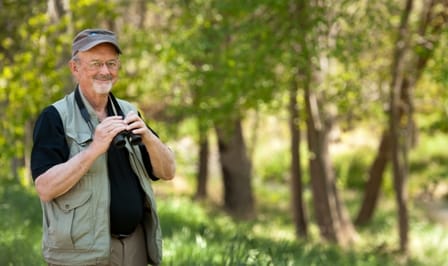Biologist and author Frank Lang shares how Asante’s expertise in emergency stroke care and long-term rehabilitation saved his life
After a stroke even the most simple daily tasks, or remembering what month it is, can become challenging. Recovery depends on fast action and the right therapy. Frank Lang, retired professor of biology at Southern Oregon University and longtime host of Nature Notes on Jefferson Public Radio, knows this very well.

Frank Lang, biologist, author, and bird watcher, recovered from stroke and enjoys life again.
It was the middle of the night on December 15, 2010, when Frank got up to go to the bathroom. “And I just sank to the floor,” he recalls. “My wife, Suzanne, asked what was wrong. I was flopping around on the rug. All I could do was mumble.” Frightened, she called 9-1-1. Paramedics from Ashland Fire and Rescue arrived in minutes and immediately identified Frank’s condition as a stroke. Suzanne insisted that they take Frank to Asante Rogue Regional Medical Center, which is a certified Primary Stroke Center.
They arrived in less than 30 minutes. The stroke care team in the Emergency Department quickly stabilized Frank and administered lifesaving drugs to restore blood flow to his brain. The fast action of Frank’s wife, the paramedics, and the stroke team had minimized the adverse effects of the stroke, but the temporary blockage in his carotid artery had damaged his brain. He had left-side neglect (the inability to see images on his left side or sense the left side of his body), weakness in his legs, balance issues, and memory and thinking problems. “The neurologist tested me, and I could do only sixth-grade math,” Frank chuckles. He needed rehabilitation.
The stroke team cared for Frank around-the-clock in the neuroscience unit. Neurologists and therapists immediately began his rehabilitation through exercises to improve his balance, vision, and thinking skills. “And they never said a discouraging word,” Frank says.
Frank improved enough to transfer to the Inpatient Rehabilitation Center, where patients recovering from stroke, traumatic injury, or severe illness receive intensive therapy for several hours every day. He stayed there for three weeks as speech, physical, and occupational therapists helped him return to a normal life.
“It’s the entire top floor of the north tower of the hospital,” Frank recalls. “And it’s like a cruise ship. The views were fabulous, and the staff was so helpful.” They even helped him celebrate Christmas with his family. “But they make you work hard,” Frank adds, “every day.”
Under the guidance of his physical therapist, Frank exercised in the gym to regain strength and balance. The occupational therapist helped him recover his motor coordination to eat, write, and do household tasks. Most important for him, the speech/language pathologist gave him exercises to regain his memory and thinking skills. “A lot of it was word games,” he recalls. “‘What month comes after May?’ But they worked wonders.”
Before Frank was discharged, physical therapists visited his home to evaluate how well he could negotiate the stairs and the shower. “That required some handrails, which, once installed, made me wonder why we didn’t install them when we built the house. But then we weren’t thinking 30-plus years ahead,” Frank says.
After leaving the hospital, Frank continued speech therapy with Asante Rogue Regional’s outpatient rehabilitation. “I was still having trouble with short-term memory and recalling words and colors,” Frank says. Speech therapist Hilary Anderson noticed that he was having difficulty with planning strategies. She used maps as exercises to plan trips. Next she encouraged him to use an iPad for brain exercises at Lumosity. “That technology has made a huge improvement in our therapy,” Hilary says.

Hilary Anderson, SLP (r) and Frank Lang (l) in therapy at Asante Rogue Regional Medical Center Outpatient Therapy.
Frank agrees: “It made all the difference.”
Frank still has challenges but says he has made a great recovery. He hiked on the new Plaikni Falls Trail at Crater Lake and is driving again. “I don’t think I would have recovered nearly as much without rehabilitation at the hospital,” he says. “And I tell everyone, have a plan:
- Know whom to call.
- Know where to go.
- Take your statins.
- Do not eat the chicken skin!
“You never know when a stroke will come, and your life can change in a heartbeat.”


